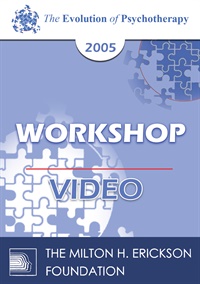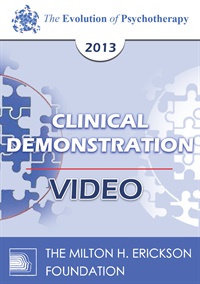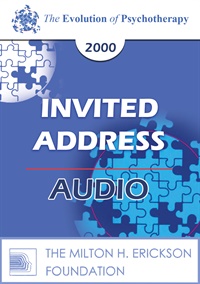
- Average Rating:
- Not yet rated
- Topic Areas:
- Suicide | Invited Addresses | Law & Ethics | Psychotherapy | Religion
- Categories:
- Evolution of Psychotherapy | Evolution of Psychotherapy 2000
- Faculty:
- Thomas Szasz, MD | James F. Masterson, MD
- Duration:
- 1 Hour 28 Minutes
- Format:
- Audio Only
- Original Program Date:
- May 25, 2000
- Short Description:
- This address is a radical inquiry into voluntary death ("death control"). Is suicide legal? Should involuntary suicide prevention be legal? Should physician-assisted suicide be legal? Personal careers, professional identities, multi-billion dollar industries, legal doctrines, judicial procedures and the liberty of every American hangs on our answers and on our justifications for them.
- Price:
- $15.00 - Base Price
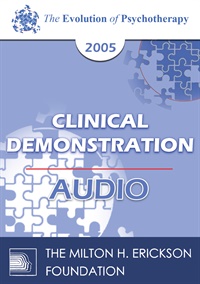
- Average Rating:
- Not yet rated
- Topic Areas:
- Clinical Demonstrations | Suicide | Psychotherapy
- Categories:
- Evolution of Psychotherapy | Evolution of Psychotherapy 2005
- Faculty:
- Donald Meichenbaum, PhD
- Duration:
- 57 Minutes
- Format:
- Audio Only
- Original Program Date:
- Dec 10, 2005
- Short Description:
- Educational Objectives: To describe the role that cognitions and related factors play in suicide. To list five core tasks in treating suicidal patients.
- Price:
- $15.00 - Base Price
- Average Rating:
- Not yet rated
- Topic Areas:
- Workshops | Suicide | Dialectic Behavior Therapy (DBT) | Psychotherapy | Bipolar
- Categories:
- Evolution of Psychotherapy | Evolution of Psychotherapy 2005
- Faculty:
- Marsha Linehan, PhD
- Course Levels:
- Master Degree or Higher in Health-Related Field
- Duration:
- 2:53:44
- Format:
- Audio and Video
- Original Program Date:
- Dec 08, 2005
- Short Description:
- This workshop will start with a brief overview of Dialectical Behavior Therapy and other efficacious treatments for suicidal behaviors and BiPolar Disorder. We will then present a series of videos of DBT applied to BPD patients with intermittent commentary and discussion of the DBT procedures as they are used in the sessions.
- Price:
-
Sale is $29.00
price reduced from Base Price - $59.00
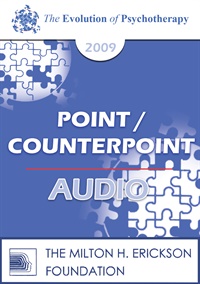
- Average Rating:
- Not yet rated
- Topic Areas:
- Point/Counterpoint Sessions | Suicide | Psychotherapy
- Categories:
- Evolution of Psychotherapy | Evolution of Psychotherapy 2009
- Faculty:
- James Hillman, PhD
- Duration:
- 1 Hour 23 Minutes
- Format:
- Audio Only
- Original Program Date:
- Dec 12, 2009
- Short Description:
- An expanded understanding of the suicidal urge, and reasoning, belongs to the capability of any therapist, since suicide is always a human potential. The therapist needs to come to terms with his/her own suicidal urges, fears and fantasies, and ideas of death as well. Objective reports – diagnosis, demographics, age groups, psychological situation, social history, personal styles, etc. may or may not help the practitioner in encountering the client’s risk of suicide.
- Price:
- $15.00 - Base Price
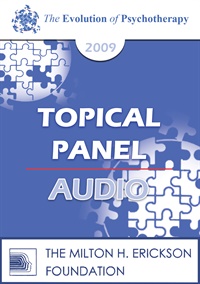
- Average Rating:
- Not yet rated
- Topic Areas:
- Suicide | Topical Panels | Psychotherapy
- Categories:
- Evolution of Psychotherapy | Evolution of Psychotherapy 2009 | Pioneers in Couples and Family Therapy
- Faculty:
- James Hillman, PhD | Cloe Madanes, HDL, LIC
- Duration:
- 59 Minutes
- Format:
- Audio Only
- Original Program Date:
- Dec 11, 2009
- Short Description:
- This panel on suicidal behavior features case studies and insights on treating depression and chronic conditions through family therapy and creative interventions. Cloe Madanes highlights recovery through lifestyle reframing and paradoxical techniques, while James Hillman focuses on the deeper motives behind suicidal thoughts, such as revenge or risk. The discussion also examines ethical and societal dimensions, emphasizing community support and the balance between personal autonomy and social responsibility.
- Price:
- $15.00 - Base Price
- Average Rating:
- Not yet rated
- Topic Areas:
- Clinical Demonstrations | Addiction | Depression | Suicide | Storytelling | Constructive Narrative
- Categories:
- Evolution of Psychotherapy | Evolution of Psychotherapy 2013
- Faculty:
- Donald Meichenbaum, PhD
- Course Levels:
- Master Degree or Higher in Health-Related Field
- Duration:
- 1:00:02
- Format:
- Audio and Video
- Original Program Date:
- Dec 14, 2013
- Short Description:
- In this video presentation, Dr. Meichenbaum works with a young woman who is depressed and who has attempted suicide seven times. She has undergone multiple traumas in her life, including rape, suicide by her mother, substance abuse. The case illustrates ways to conduct risk assessment and how to use a constructive narrative treatment approach to identify and bolster the client’s strengths and resilience.
- Price:
-
Sale is $29.00
price reduced from Base Price - $59.00
- Average Rating:
- Not yet rated
- Topic Areas:
- Invited Addresses | Suicide | Psychotherapy | Research
- Categories:
- Evolution of Psychotherapy | Evolution of Psychotherapy 2013
- Faculty:
- Marsha Linehan, PhD
- Course Levels:
- Master Degree or Higher in Health-Related Field
- Duration:
- 57:21
- Format:
- Audio and Video
- Original Program Date:
- Dec 13, 2013
- Short Description:
- There is no area of research that brings a complex array of ethical issues into sharp focus more than conducting treatment trials when the focus is on decreasing suicidal behavior and preventing suicide. Historically, suicidal individuals have been excluded from treatment studies because their inclusion was thought to be unethical, unsafe or too difficult to manage clinically. This presentation will discuss where the field of suicide intervention research started, the successes and failures we have encountered thus far, as well as the critical issues that still need to be addressed in order to move the field forward.
- Price:
-
Sale is $29.00
price reduced from Base Price - $59.00
Tags: Suicide Psychotherapy Research
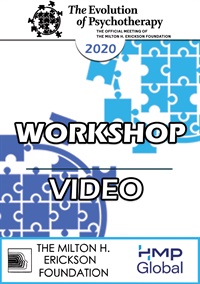
- Average Rating:
- Not yet rated
- Topic Areas:
- Depression | Workshops | Grief | Suicide
- Categories:
- Evolution of Psychotherapy | Evolution of Psychotherapy 2020
- Faculty:
- Donald Meichenbaum, PhD
- Course Levels:
- Master Degree or Higher in Health-Related Field
- Duration:
- 2 hours
- Format:
- Audio and Video
- Original Program Date:
- Dec 09, 2020
- Short Description:
- Contemporary minority professionals, with college degrees, positions in higher education, private practitioners, and other workspaces, often encounter dilemmas about their lack of advancement or self-efficacy. The within-group diversity among these women requires a cultural competency mindset, one that engages clients from a strength versus deficit or stereotyped-based perspective. In this workshop, participants will engage in activities to foster social identity examination as a bridge to recognizing the Latina social identities paradigm. Dilemmas that emerge because of the Maria Paradox messages, sexualized societal attitudes about Latinas, and “presumed incompetence” will be examined. Participants will leave with a guide for empowering professionals through solution-oriented culture-centered psychotherapy practices.
- Price:
-
Sale is $29.00
price reduced from Base Price - $59.00
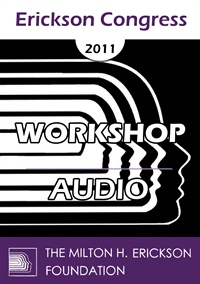
- Average Rating:
- Not yet rated
- Topic Areas:
- Workshops | Ericksonian Hypnosis and Therapy Techniques | Schizophrenia | Suicide | Trauma
- Categories:
- Erickson Congress | Erickson Congress 2011
- Faculty:
- John Frykman, MDiv, PhD
- Duration:
- 59 Minutes
- Format:
- Audio Only
- Original Program Date:
- Dec 07, 2011
- Short Description:
- Will relate work with: 1. A woman severely abused and traumatized in a family headed by an "evangelical minister father." 2. A severely depressed, suicidal college teacher, from an abusive family, with what appears to be social phobia, inability to maintain personal relationships, etc. 3. Woman diagnosed as schizophrenic at the age of 9 and her struggle for survival at age 18. On outpatient medications of 800 mg of Thorazine daily. Videos and other AV materials will illustrate these cases. Group members will be invited to share their "impossible cases" and strategies for change and resolution will be developed.
- Price:
- $20.00 - Base Price
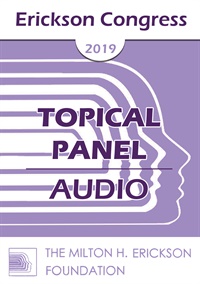
- Average Rating:
- Not yet rated
- Topic Areas:
- Workshops | Ericksonian Hypnosis and Therapy Techniques | Resistance | Suicide | Utilization
- Categories:
- Erickson Congress | Erickson Congress 2019
- Faculty:
- Eric Greenleaf, PhD
- Duration:
- 1 Hour 54 Minutes
- Format:
- Audio Only
- Original Program Date:
- Dec 12, 2019
- Short Description:
- Utilization of Dr. Erickson's approaches can be daunting. They are both meticulously planned and rehearsed, as with his Induction for Resistant Patients, and spontaneous and intuitive, responding at the moment to his patient. Dr. Greenleaf will present 7 of his own brief cases, each of which required spontaneous, intuitive response to patient needs. They are called: 2 Promises: Postcards, Death Grip; 2 Threats: Bust, “I Like That Wall”; 2 Doorways to Reality: “You Wonned”, “I’d Like to Have That Desk” and "3 Counter Tenors"
- Price:
- $15.00 - Base Price
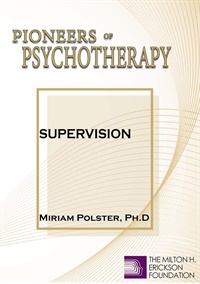
- Average Rating:
- Not yet rated
- Topic Areas:
- Clinical Demonstrations | Eating Disorders | Gestalt | Suicide | Psychotherapy | Supervision
- Bundle(s):
- Women Pioneers of Psychotherapy | Pioneers of Psychotherapy Bundle
- Categories:
- Pioneers of Psychotherapy | Evolution of Psychotherapy | Evolution of Psychotherapy 2000
- Faculty:
- Miriam Polster
- Course Levels:
- Master Degree or Higher in Health-Related Field
- Duration:
- 01:01:00
- Format:
- Audio and Video
- Original Program Date:
- May 26, 2000
- Short Description:
- Miriam Polster (2000) demonstrates supervision with Wendy, a clinical social worker who conducts therapy in the home. Polster’s supervision focuses on finding Wendy’s unique gifts and how these can be integrated into therapy. Next, Steve is working with a woman who has a history of bulimia and has threatened suicide. Polster follows this demonstration by explaining her work.
- Price:
-
Nate Sub 1.1 Price is $0.00
price reduced from Base Price - $59.00


